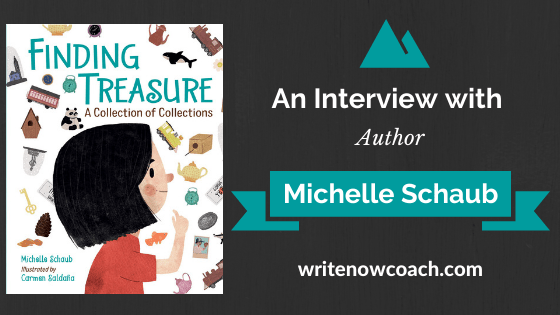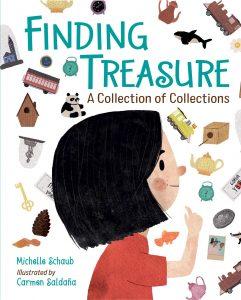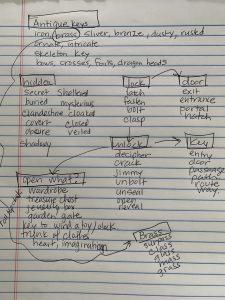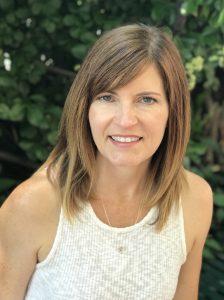Writers@Work: An Interview with Michelle Schaub

Writers@Work:
An Interview with Michelle Schaub
By Rochelle Melander
 I am delighted to welcome Michelle Schaub to the blog to talk about her new book of poems, Finding Treasure. Michelle will appear at Boswell Book Company this Friday, November 15 at 4:00 PM. Michelle, can you talk about your new book, Finding Treasure: A Collection of Collections and how you came up with the idea to write about collections?
I am delighted to welcome Michelle Schaub to the blog to talk about her new book of poems, Finding Treasure. Michelle will appear at Boswell Book Company this Friday, November 15 at 4:00 PM. Michelle, can you talk about your new book, Finding Treasure: A Collection of Collections and how you came up with the idea to write about collections?
I first thought about writing a poetry book about things people collect when I was participating in author Tara Lazar’s STORY STORM a few years ago. In this challenge, writers come up with a new picture book idea each day for the entire month of January. At the beginning of the month, I was humming along with ideas, but toward the month’s close, writer’s block set in. One day, when I was particularly stumped, I started looking around my office for idea sparks. My eyes landed on a row of seashells I’d saved from my grandmother’s shell collection. I started brainstorming different items that other family members and friends collect. My father-in-law collects trains. My husband has boxes stacked in the basement from his childhood baseball card collection. The neighbor around the corner has a collection of birdhouses swinging from his front porch. Eventually, each of these topics became a poem in the book. But I still needed something to hold the poems together. So, I invented a protagonist who needs to bring in a collection for a class assignment. The only problem: she doesn’t know what to collect. This gave the book an arc: a hunt for the perfect collection!
I love how this book uses many poetry forms Can you talk about how you write poetry—do you start with the idea, the form, the words and images?
When putting together a poetry collection, usually I start with the idea. My poetry collections revolve around a specific topic, like farmers’ markets in my first book, Fresh-Picked Poetry, and the hobby of collecting in Finding Treasure. Once I have the book’s theme, I make lists of all the concepts associated with that theme that might lend themselves to poems. For Finding Treasure, I started with a list of more traditional, obvious items people collect, like rocks, shells, and baseball cards. Next, I like to think outside the box and generate ideas that approach my topic from new, surprising angles. For example, with Finding Treasure, I asked myself, could someone have a collection of intangible items? This gave me the idea for the poem “My Mail Carrier’s Cache” about a mail carrier that collects smiles. I also asked, when does collecting move from hobby to profession? This gave me the idea for the poem “The ‘Gist of Collecting” about scientists who collect items in the name of research.
 Once I have a hearty list of potential poem topics, I dig into writing the individual poems. My process for writing a poem varies. Sometimes a line or word will pop into my head, and I’ll build the poem around that. For example, with the poem “Whose Forgotten Keys,” I started with the words keys, hidden, lock, and door. Then I made lists of synonyms and rhymes for those words. Once I fill a page in my notebook with word associations, I start arranging them into phrases and playing with rhythm and meter.
Once I have a hearty list of potential poem topics, I dig into writing the individual poems. My process for writing a poem varies. Sometimes a line or word will pop into my head, and I’ll build the poem around that. For example, with the poem “Whose Forgotten Keys,” I started with the words keys, hidden, lock, and door. Then I made lists of synonyms and rhymes for those words. Once I fill a page in my notebook with word associations, I start arranging them into phrases and playing with rhythm and meter.
Other times, I start with form. As a teacher, I’m always mindful of how my poetry collections can be used as mentor text. To that end, I purposefully include a variety of poetry formats. One of my favorite fun and accessible forms to include is a two-voice poem. In Finding Treasure, I set out to write “My Brothers and Their Baseball Cards” as a conversation between two card-collecting siblings.
No matter how I start a poem, something usually happens in the process of writing that twists the poem in a surprising direction. Overall, I’m open-minded and flexible and let the creative process lead me where it will.
Do you have some writing craft tips for people who want to write poetry for children?
Be a word collector. Stop to notice and savor the flavor of individual words. Store these delicious words away for the moment when you need just the right pinch of sweetness, spice, or tang to finish a poem. The more words you have stored away in your word cupboard, the more likely you’ll be to find the right one for the right moment. Which reminds me of my favorite Mark Twain quote: “The difference between the right word and the almost-right word is the difference between lightning and a lightning bug.”
You have written several books of poems—can you talk about how you started writing poetry for children?
I began my career writing nonfiction articles for children’s magazines such as Highlights and Appleseeds. At one point, I saw a class advertised through the Illinois chapter of the Society of Children’s Writers and Illustrators (SCBWI) called “The ABCs of Children’s Poetry.” Since I had always enjoyed reading and writing poetry, the topic piqued my interest. The class, taught by children’s poet Heidi Roemer, opened my eyes to new poetry forms, topics, and outlets for publication. I fell in love with the challenge of putting just the right words into just the right order to entertain and delight children. After the class, I started sending poems to children’s magazines. Ladybug was the first publication to accept one of my poems. After I published a few more poems in magazines, I started submitting poems to anthologies. The first anthology to publish one of my poems was And the Crowd Goes Wild: A Global Gathering of Sports Poems. As I gained more confidence, knowledge, and publishing credits, I started working on my own poetry collections.
What are you reading now?
Currently, I am enjoying Poem Crazy, by Susan Goldsmith Wooldridge. It’s part reflection, part instruction, and wholly whimsical and inspiring. At heart, it’s an invitation to play with language, something that we poet’s love to do.
 About the author. Michelle Schaub’s poems have appeared in several anthologies and magazines. She is the author of This or That Sports Debate: A Rip-Roaring Game of Either/Or Questions and Vehicles of World War I (Capstone Press). Michelle lives in Downers Grove, Illinois. You can find her on Twitter @Schaubwrites.
About the author. Michelle Schaub’s poems have appeared in several anthologies and magazines. She is the author of This or That Sports Debate: A Rip-Roaring Game of Either/Or Questions and Vehicles of World War I (Capstone Press). Michelle lives in Downers Grove, Illinois. You can find her on Twitter @Schaubwrites.









great interview and great advice!